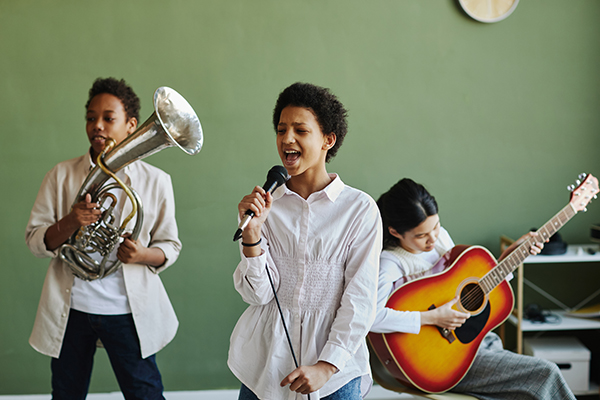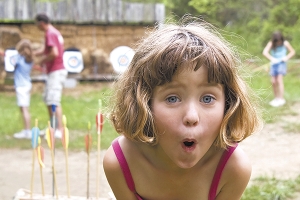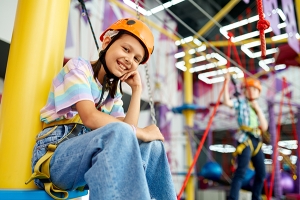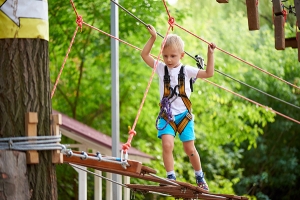
Whether your child wants to play an instrument in marching band, perform in the school musical, or become the next viral TikTok sensation, the early years are a perfect time to explore musical interests and endeavors. Beyond developing music skills, kids benefit in many ways from music classes, lessons and summer camps.
“Music education is amazing because it shapes the whole child,” explains Jeremy Wuertz, a teacher and band director at San Dieguito Academy. “[Benefits include] teamwork, artistry, higher level cognition skills, self-confidence, social relationships/community and much more.”
From better academic performance to improved social-emotional wellbeing, below are important reasons to support your child’s musical curiosity and journey.
COGNITIVE BENEFITS
According to School of Rock San Diego, “Exposure to music allows young brains to soak in the range of notes, tones and words they will later use, and build neural pathways that can influence and enhance cognitive ability for a lifetime.”
Research suggests that music education positively impacts language development, memory, concentration, listening skills, creative thinking and academic performance. With so much to gain, it’s never too early to get started. Music exposure is a good way to start for young children.
“San Diego Symphony’s Symphony Kids Series is all about welcoming little ones (ages 0–5) into the concert hall for a fun introduction to music,” says Laura Reynolds, who spearheads education and community engagement at San Diego Symphony. “Hosted by LA-based artist David Castillo, these relaxed, sensory-friendly concerts explore the orchestra one instrument family at a time—through sing-alongs, dance-alongs and short, engaging pieces performed by San Diego Symphony musicians.”
Families enjoy Symphony Kids events such as Meet the Winds and Meet the Percussion, which include pre-concert activities like instrument exploration, crafts and story time. Families with kids ages 6–12 may enjoy San Diego Symphony’s Family Concert Series performances. Find more information at www.sandiegosymphony.org.
PHYSICAL BENEFITS
There are also physical benefits to music. Those who play an instrument experience improved coordination, motor skills, posture, breathing and aerobic health. Kids who carry heavy marching band instruments build muscle and strength.
If your children love to dance when music plays, encourage them. Dancing is an excellent form of cardiovascular exercise. Consider music appreciation classes, dance camps (hip hop, ballet, tap, jazz) or crank up some tunes at home.
SOCIAL-EMOTIONAL BENEFITS
Kids participating in music programs experience an array of social-emotional benefits, including improved self-confidence and the ability to work in a team. Since making music is often a group activity, musicians tend to develop close friendships.
According to a recent study conducted by University of Southern California (USC), music education boosts overall wellbeing in adolescents.
SUMMER CAMPS, MUSIC CLASSES AND LESSONS
School breaks are a great time for kids to develop, maintain or improve musical skills through classes, lessons and spring and summer camps.
“One great camp in the area is San Diego Summer Music Institute (SDSMI),” says Wuertz. The one-week instrumental music camp offers both residential and commuter options. San Diego Winds, the organization behind SDSMI, also offers honor band and music education opportunities during the school year. Learn more at www.sdwinds.org.
Some parents wonder about the necessity (and expense) of private lessons to enhance skills. “Private lessons are not necessary, but they accelerate musical growth in a meaningful way,” explains Wuertz. “Just as with any specialized skill, learning from a professional in a one-on-one setting can be transformative for a young musician.”
If private lessons are cost-prohibitive, see if your child’s school district has connections to high school students who give free or low-cost lessons to younger musicians.
Another fun place to explore a variety of music and instruments is the Museum of Making Music in Carlsbad, which encourages family visits, school field trips and homeschool groups. Find information at www.museumofmakingmusic.org.
Noteworthy
- Keeping the focus on fun is important, especially for young children. Kids should have opportunities to make friends, perform regularly and participate in other activities while developing musical skills.
- If notes sound squeaky, out of tune and not-at-all melodious in the beginning, you are not alone. Encourage short bouts of daily practice. They’ll sound better soon—we promise!
Kids may or may not continue making music into adulthood. Whatever they decide, the valuable lessons learned through music education will last a lifetime.
Lisa Pawlak is an award-winning contributing writer who lives in Encinitas with her family.

















